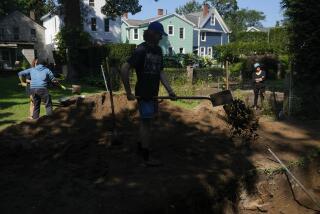Resting Places of History : Cemetery, Stores Link Fort Bidwell to Its Frontier Past
- Share via
FORT BIDWELL, Calif. — If you want to find out who was buried before the turn of the century in the cemetery in this tiny hamlet, check the back of Kober’s Drygoods Store.
Names and dates of the first burials were scrawled on the wall, which served as the town’s original cemetery record. Most are still faintly legible.
The store opened in the 1860s and continued in operation until the February, 1984, death of Elsie Kober, 82, whose father and uncle ran the store before her.
Ladies, Gents Furnishings
An old sign on one wall proclaims “Ladies & Gents Furnishings,” and numerous unsold items dating to the early years of the store were still on shelves and in showcases at the time of Elsie Kober’s death.
There were 75 pre-1900 corsets, 150 unopened boxes of 19th-Century women’s high-top shoes, and an array of century-old men’s, women’s and children’s clothing, fabrics, tools and square nails.
Linda French, 38, a local nurse, now owns Kober’s Drygoods and much of its contents. She plans to reopen it next year as a combination museum and store.
Fort Bidwell, population 100, is California’s northeastern-most town, 10 miles from Oregon and seven miles from Nevada. With only country roads leading here, it is one of the most out-of-the-way places in the state. A Paiute Indian reservation with 125 residents adjoins the hamlet at the foot of the Warner Mountains’ Fandango Pass, elevation 4,560 feet.
From time to time pigs, cows, geese, ducks and chickens from surrounding farms wander up and down the main street of Fort Bidwell. A creek flows through the heart of the town.
Kober’s is not the only century-old business in the little-known northeastern gate to the Golden State.
Jim Palmer, 47, and his wife, Kathy, 48, run the general store, which has been continuously operated since the 1870s, making it one of the oldest general stores in California. Its doors and windows are made of iron.
The three-room Fort Bidwell Hotel and Restaurant dates only to 1906. It is operated by Charlie Massie, 61; his wife, Eva, 58, and their son, Chip, 27.
Fort Bidwell boasts an unusual industry, the pollen company of Walter Baker, 69, and his wife, Virginia. The couple collect pollen from 25 species of trees, plants and grasses within 250 miles and sell it to medical laboratories, where it is processed to treat people with allergies.
Ruell Bucher, 82, and his wife Thelma, 77, have been caretakers since 1960 of the Fort Bidwell Cemetery, which is located high on a hill overlooking the town.
They were paid $150 a year until last year when they hired Tex Benner, 68, to help. He now receives the $150 from the cemetery trust fund set up by the Kober family nearly a century ago.
Know Locations and Stories
But the Buchers, lifelong residents of Fort Bidwell, are still in the cemetery every day, raking, planting and visiting with anyone who enters the gates. Bucher has been the cemetery trustee since 1960 and has dug most of the graves since then.
“We know the location and stories about every one of the more than 500 buried here except the graves holding the unknowns,” Thelma Bucher said. “We know all them that’s been buried here since we were little kids.”
They told how the first person buried there was a soldier who drank too much at the local brewery in 1865, fell off his horse and froze to death. In all, 50 soldiers were buried in the cemetery from 1865 to 1893 when an army outpost, Ft. Bidwell, was located here. Every Memorial Day the Buchers place flowers on the graves.
It was Thelma Bucher’s grandfather, Peter Peterson, who went to Washington early in 1865 to petition the Army to establish the outpost as protection against Indians.
Brig. Gen. John Bidwell’s support of the proposition led to the naming of the fort in his honor. Bidwell was later a congressman and the 1892 presidential candidate for the Prohibition Party.
History in Graveyard
Many visitors come here hunting graves of ancestors who served at the old Army post or were among the several thousand people in the area during a turn-of-the-century mining boom. Others who come to Fort Bidwell “are people who visit old cemeteries as a hobby. They enjoy the history in this graveyard,” Thelma Bucher said.
But she and her husband also recalled a woman who came from Washington state looking for her grandfather’s grave.
“Her grandfather was lynched for being a horse thief,” Ruell Bucher said. “She had no idea about his infamous past. It came as a great shock to her.”
More to Read
Inside the business of entertainment
The Wide Shot brings you news, analysis and insights on everything from streaming wars to production — and what it all means for the future.
You may occasionally receive promotional content from the Los Angeles Times.










